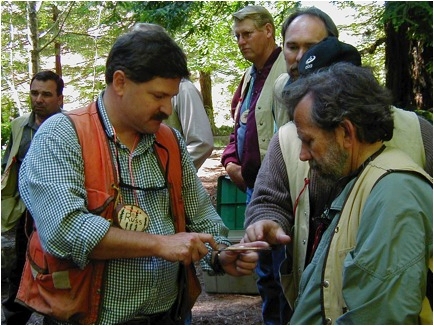For almost 20 years now, UC Forest Advisors and Specialists, along with a dedicated group of volunteers, have been leading summer training opportunities to inspire K-12 teachers to teach about environmental issues.
Living in an urbanized state, few Californians recognize how much they depend on the forest for water, wood products and wildlife habitat, as well as their responsibility for its proper management. Through environmental learning integrated into the educational system, students can discover how to make critical choices about issues such as forest health, ecosystem management, consumerism and local economies.
The goal of the Forestry Institute for Teachers (FIT) is to provide California's K-12 teachers with knowledge, skills and tools to more effectively teach forest ecology and forest resource management practices. The program is co-sponsored by UCCE, the Northern California Society of American Foresters, US Forest Service and many other organizations. FIT brings natural resource specialists together with teachers from both rural and urban schools for one week, working side by side to explore the intricate interrelationship of forest ecosystems and human use of natural resources. The science-based curricula explore many subject areas, including environmental science, physical science, social science, biology, forestry and history. At each session, more than 40 local resource professionals representing many disciplines are invited to teach components of the course. UCCE advisors and specialists serve as co-directors and teachers. FIT offers annual institutes in three Northern California locations: Humboldt, Shasta and Plumas Counties. Back at their schools, FIT participants conduct in-service training for colleagues, and develop forestry education projects with their students.
Since 1993, over 1,300 K-12th grade teachers, evenly spread among grades, have participated in FIT. About one-third of the teachers come from Southern California, one-third from central and rural California and one-third from the Bay Area and Sacramento. Their responses to the course emphasize (1) new insight into the complexity of forest management and (2) activities and lessons that prove valuable in the classroom. Because teachers have utilized the activities and information gained from FIT in the classroom, students are improving their knowledge and decision-making skills. FIT has received a number of environmental education awards.
A graduate from the 2011 program shared, “I came up here expecting more of a science based workshop but left with so much more. Yes, science based but more of an understanding of our forest, the timber industry and ways to implement this information into the classroom- even when we don’t live near a “forest” environment. The web of involvement (people, agencies, policies, environmental groups, landowners) to most people is not known. I have gained a greater appreciation for those who are involved. Taking this back to the classroom will be much different than just teaching “the surface” (leaves, water, habitats). Now I will have the “meat” to all these lessons I have been teaching for years. Thank you for a wonderfully organized and extensive week! I will be taking what I have learned not only to my students but to the staff of my school, my friends and my family.”
While another stated; “Awesome! I really appreciate this opportunity. The FIT program is one of the BEST training courses I’ve ever participated in- great mix of perspectives & activities. It’s obvious that you’ve been offering the program for many years- it’s fine-tuned & perfect. Thank you!”
Four week-long sessions are offered in California. To learn more about FIT visit: www.forestryinstitute.org.
Learning how to read a tree core.
FIT teachers busy learning to identify amphibians.
Learning to measure the diameter of a redwood tree.
Sampling gravel to learn if conditions can support fish spawning.



